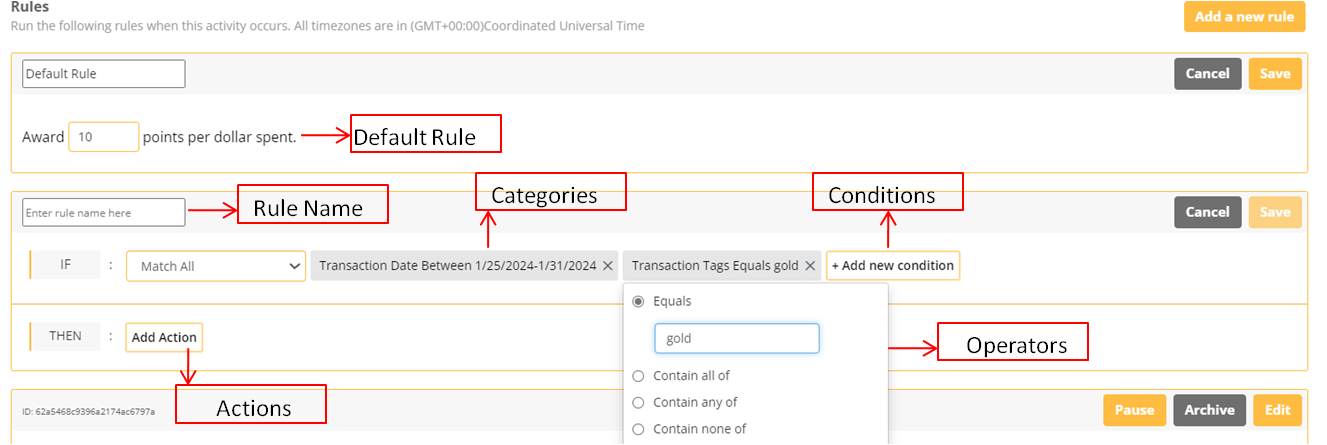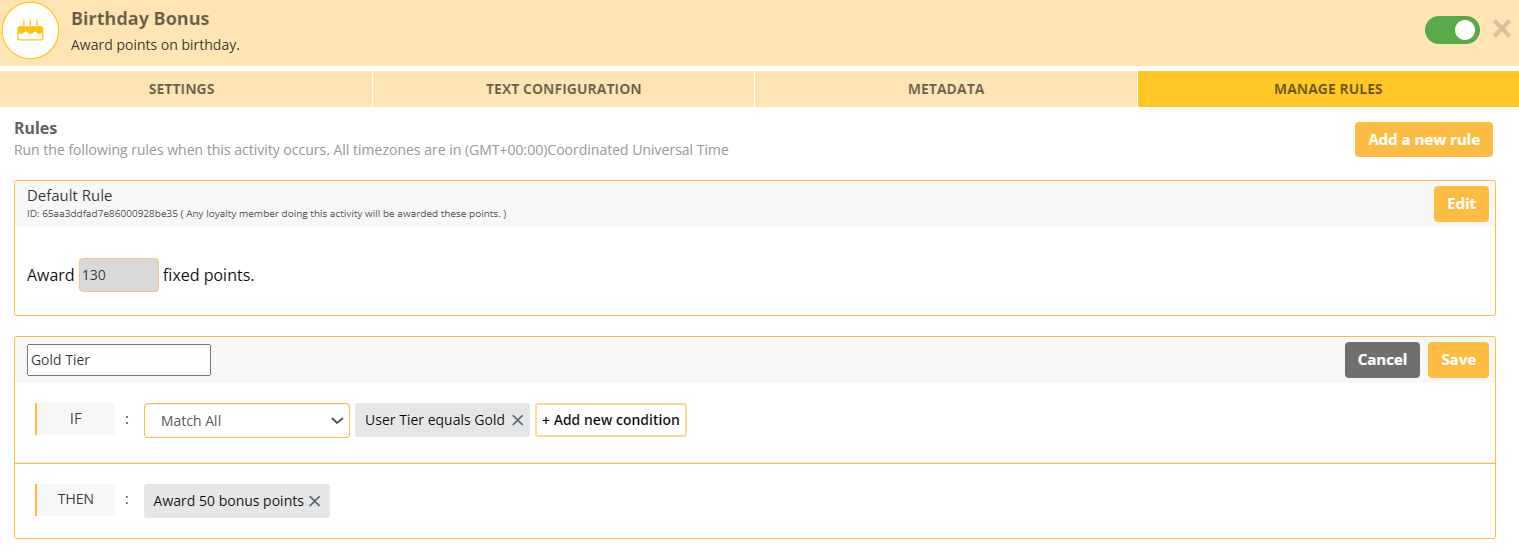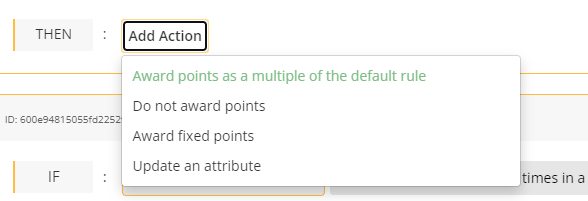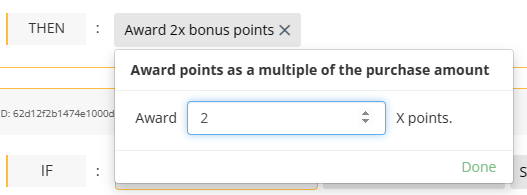Activity Rules
Introduction
Activity rules within the Zinrelo system are designed to encourage customers to participate in specific activities. By performing these activities, customers earn points, creating an incentive for them to return and actively engage with the loyalty program to accrue additional rewards and points.
In this help document, we will have a comprehensive understanding of how activity rules operate and explore the different types available within the system.
How to set activity rules?
To set up the activity rules, you have to go to Program Settings >> Activities >> Activity for which the rules have to be set.
The rule engine works on the conditions, its categories, and actions.

This is how the rule engine works:
- If any activity matches all or any of the set conditions, then the set action will be taken.
- These conditions are set on Member and Activity Attributes.
- There are different categories under each attribute on which we can set conditions on. Like transaction tags, user tier, available points, birthday, etc.
And each category has their operators which are selected on the basis of the requirements. For example:
- If the category is ‘Date’ like Enrollment Date, Birthday, Last Points Earned Date, etc., then its operators could be Relative (more than, less than, etc.) and Absolute (after, before, on, etc.)
- If the category is ‘Number’ like Number of Reviews, Number of Purchases, etc., then its operators will be less than, greater than, equals and between.
- If the category is ‘String’ like member tags, city, nationality, etc., then its operators will be equals, not equals, in and not in, contain all of, contain any of, etc.
Note: The date added to the end date will be excluded from the business rules when using the 'between' operator. Only the start date and a date before the end date will be considered.
Points to be noted:
There are some points to be considered in purchase activities:
- When individual product prices are provided, the subtotal is ignored.
- In instances where product information is absent, the purchase amount is derived from the 'order_subtotal' field.
- It is important to note that points are calculated based on product prices sent to us. Please ensure that any discounted prices are appropriately adjusted in the products and transmitted accordingly.
- In cases where product prices cannot be forwarded to us, kindly provide the subtotal of all the products. However, it is essential to note that product-specific rules, including those related to product ID, category, prices, etc., will not be evaluated, as detailed product information is not transmitted to us.
Types of Activity Rules
In the realm of point allocation for member activities, a comprehensive set of rules governs the distribution of points, ensuring a tailored and flexible rewards system. The primary framework consists of the Default Rule, Exclusion Rule, and Bonus Points, each playing a pivotal role in shaping the reward structure. This is detailed below:
Default Rule
Each activity comes with a default rule set, determining the points awarded to a member. This default rule can be either a fixed point value or points per dollar spent, depending on the nature of the activity.

Every member who performed the activity will be awarded points based on the default rule set for an activity.
To change the default rule value, click on the “Edit” button and update the value.

Exclusion Rule
If an exclusion rule is applied to an activity, no points will be awarded when the specified conditions are met. It's important to note that the exclusionary rule takes precedence over any other rule set for the activity.
Please be aware that only one exclusion rule can be applied to an activity.
Bonus Points Rules
Apart from the default rule pre-set for all activities, you have the flexibility to apply additional rules to each activity, granting extra points to members on top of the default allocation. This can be achieved by setting rules on both member and transaction attributes in the manage rule section of each activity.
Please note that each rule is independent of the other.
Two approaches to bonus points:
Under this approach, a fixed number of points can be assigned to a member in addition to the default rule when they engage in an activity.
For instance, in the "Birthday Bonus" activity, where 130 points serve as the default value, members in the "Gold" tier can receive an extra fixed 50 bonus points on their birthday. This results in a total of 180 points (130 default points + 50 points set in rules).

The Multiplier Rule allows specifying a value that multiplies the default rule points, delivering additional bonus points to the member.

For example, in the "Write a Review" activity with a default rule of 100 points, a supplementary rule may dictate that members submitting reviews in March receive 2X points. Consequently, their total points become 300 (100 default points + 2X of default points).
Moreover, for activities with fixed points, the Default Rule value can be overridden for a specific member using the Award API. By passing the desired point value in the "points_passed" field, a member will receive points based on the new default value in addition to any applied bonus rules.
Special Cases of Activity Rules
The ‘Purchase on Website’ and ‘Submit a Receipt’ are special cases of activities where points are awarded in multiples of the purchase amount. So the rules for these activities are different too. In these activities, the default rule is a multiplier rule which awards points in multiples of the purchase amount. Similarly, bonus point rules award points in multiples of the purchase amount.

For example, if a customer buys an iPhone 6 for $200 and earbuds for $40, resulting in a purchase amount of $240, a default rule is established to award 5 points per dollar spent, with an additional 2X multiplier rule applied exclusively to the "iPhone."
In this scenario the iphone purchase will earn 2x points and the overall purchase will earn 5x points, The points calculation will look like this. The multiplier amount will be awarded based on the individual product price.
The customer's earnings would be calculated as follows:
For default Rule 1:
- 240 (purchase amount of products) X 5 (default rule) = 1200
For purchase of iPhone 6 rule 2:
- 200 (iPhone 6 price) X 2 (multiplier rule set on “iPhone 6” product) = 400
Total earning= 1200 + 400 =1600

In the example above:
The points were calculated based solely on the individual product prices, and the subtotal was disregarded since the product details/list were provided.
Updated 2 months ago
